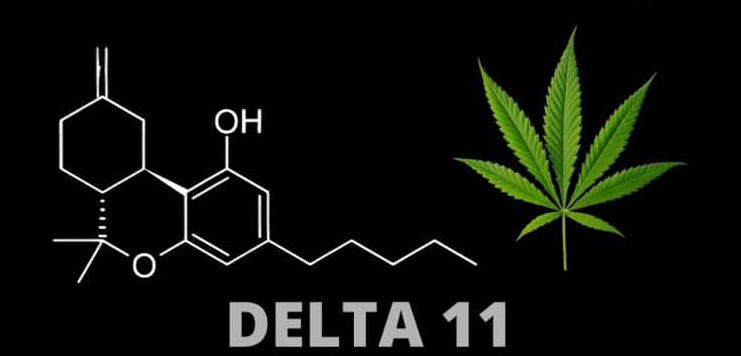What is Delta 11 THC?
What is Delta 11 THC?
Delta-11 THC is a rare cannabinoid found naturally in hemp and cannabis plants. Although Delta 11 THC is relatively unknown, it has been proven to be a game changer in the industry and has shown tremendous potential, attracting increasing attention.
Unveiling the Mystery of Delta 11 THC
In fact, Delta-11 THC is not a mediocre performer in the Hanma trend, although it was mentioned in the 1970s, there is very limited information about Delta 11 THC. However, considering its close relationship with tetrahydrocannabinol (THC) compounds, it is not surprising that it has psychoactive properties. There is almost no existing scientific literature on Delta-11 THC. The first mention of Delta 11 THC in academia can be traced back to a paper titled “The Social Impact of Cannabis Use” in 1974, followed by a laboratory study in 1990 evaluating the metabolism of this rare cannabinoid in several experimental animals. There have been no further studies published on Delta-11 THC since then.
Delta 11 THC vs 11 Hydroxy THC: Misunderstandings need to be eliminated
In general, people often equate Delta 11 THC with liver metabolite 11 hydroxyTHC, which is a common misconception. The two are different compounds and should not be confused. Currently, it is well known in the field of cannabis pharmacokinetics that 11 hydroxyTHC is widely regarded as a metabolite of Delta-9 THC in the human liver. As an intermediate, 11 hydroxy-THC cannabinoid is further converted to 11-n-9-carboxy-THC, also known as THC COOH, leading to a positive urine drug test. So, for 11 hydroxy-THC, sometimes also known as its full name 11-hydroxy-Delta-9-tetrahydrocannabinol, it is only metabolized from Delta-9 THC, not other natural forms of THC.
Delta-11 THC variant
THC is a substance that interacts with the human body in novel ways, primarily due to its unique chemical composition. Although these differences may not cause harm, it is still too early to draw conclusions about the relative benefits of different natural forms of THC, as more data is needed. The unique structure of THC makes it particularly susceptible to variants. Normally, a new cannabinoid with unique properties and effects can be obtained by rearranging the double bonds in its carbon atom chain. That’s why we see so many variants of psychoactive THC, such as Delta 8, Delta 10, Delta 11, THC O, and HHC.
The drunkenness of Delta 11 THC
There has been controversy over the intoxicating effect of Delta 11 THC, but it can be confirmed that Delta 11 THC has psychoactive properties that can excite users. This mechanism of action is similar to other cannabinoids with similar psychoactive properties, such as Delta 8, Delta 10, Delta 11, THC O, and HHC. Currently, there is little research on the efficacy of this specific cannabinoid. Although a study has shown that its efficacy may be three times that of Delta 9 THC. But further research is needed to confirm this, but with more and more anecdotal reports emerging, we can better understand the strength of Delta-11 THC.
Advantages of Delta-11 THC
Apart from the intoxicating effects exclusive to THC, there have been no further studies exploring its good properties and advantages. However, as a cannabinoid and a substance with THC properties, Delta-11 THC can interact with endogenous cannabinoid receptors in the human body, thereby having various functions such as regulating cognition, emotions, sleep, pain, and inflammation. The specific regulatory ability of Delta-11 THC is yet to be determined. However, it did follow in the footsteps of Delta-9 THC. In this case, it may be an excellent treatment alternative for those seeking to relax, uplift, relieve nausea, pain, improve sleep, and potentially increase appetite.
Conversion of Delta 11 THC
Due to the striking similarities between Delta 11 THC and other THC compounds, different forms of THC and cannabidiol (CBD) can be rapidly converted into Delta 11 THC isolates. This structural similarity is the key to the efficient production of Delta 11 THC. If you have been paying attention to emerging cannabinoids and their production methods, then you will definitely be familiar with Delta-11 THC. Although it naturally exists in hemp plants, its quantity is too small to be commercially produced. To obtain high-yield Delta-11 THC, it is necessary to use chemical catalysts or convert it from cannabidiol (CBD) through a heating process.
Product form of Delta-11 THC
Delta 11 THC is a new product on the market that is receiving increasing attention from people. It is the same product as Delta-8 THC and Delta-10 THC, the only difference being that it uses Delta 11 distillate instead of another cannabinoid distillate. At present, Delta-11 THC electronic cigarette products and edible products have appeared on the market. Similar to other e-cigarettes, the Delta 11 THC e-cigarette has a fast, powerful, and short-lived excitement function. On the other hand, Delta-11 THC edible products, such as gummies and beverages, can also provide the long-lasting, potent, stimulating, and calming effects unique to THC.
Safety of Delta-11 THC
Unfortunately, there is currently no research supporting the safety of Delta-11 THC, so it is not recommended to attempt it. Delta-11 THC has a similar chemical structure to many other cannabinoids, and so far no toxic compounds have been found in hemp plants, even in concentrated form. Therefore, Delta-11 THC may have the same drunkenness and mild, temporary side effects as other forms of THC, including dry mouth, dizziness, dry eyes, fatigue, impaired motor function, and drowsiness, which require caution.
The legality of Delta-11 THC
The current law does not specifically target Delta 11 THC, as it is not Delta 9 THC and therefore protected by federal law. However, in states that currently prohibit Delta-8 THC products derived from hemp, it may be illegal. The following states are prohibited from using Delta-11 THC products: Alaska, Arkansas, Arizona, Colorado, Delaware, Iowa, Idaho, Montana, Mississippi, North Dakota, New York, Rhode Island, Utah, Vermont, and Washington.
Conclusion
Delta-11 THC is actually an emerging “veteran” grade cannabinoid that is becoming increasingly popular in the cannabis industry. Although there is limited information about this cannabinoid, if its potent intoxicating effect is confirmed, it may be classified as a potent cannabinoid and subject to federal regulation. At present, many hemp brands have launched Delta-11 THC products, but the benefits and characteristics of this cannabinoid are still unknown, its legality varies depending on state laws, and its safety and related side effects have not been scientifically proven. Perhaps, as more research results on Delta-11 THC emerge, this emerging cannabis ingredient may become a popular choice for those seeking unique and potent cannabis experiences.
Post time: Nov-20-2024





